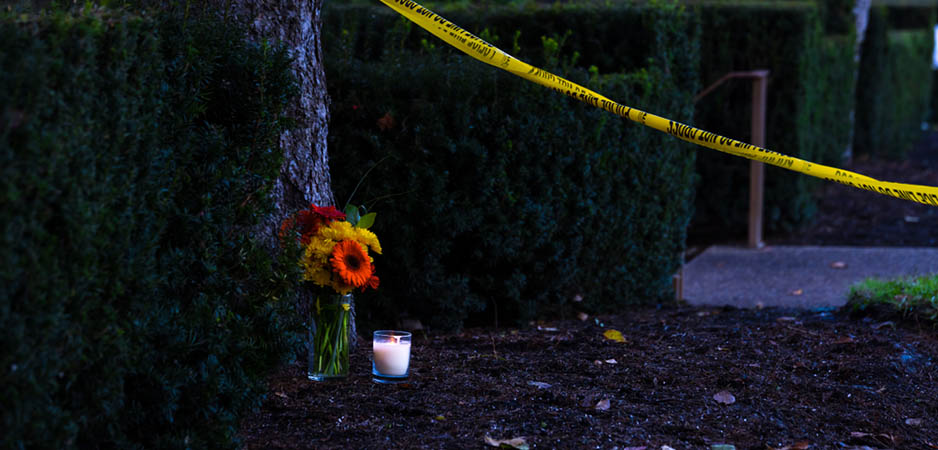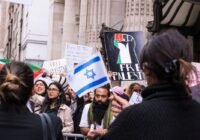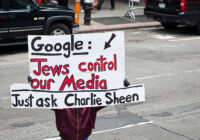In this edition of The Interview, Fair Observer talks to Reverend John C. Dorhauer, the president of the United Church of Christ.
On October 27, a gunman entered the Tree of Life synagogue in the Squirrel Hill neighborhood of Pittsburgh, Pennsylvania, and opened fire on worshippers attending the Shabbat morning services. Although police were called to the scene and SWAT forces intervened, the shooter killed 11 people and injured seven others.
It is believed that Robert Bowers, the alleged gunman, is behind the deadliest attack on the Jewish community in the history of the United States. The 46-year-old expressed a hatred for Jews on social media and told the police while in custody that he wanted “all Jews to die.” He has since appeared in a courtroom and prosecutors have demanded the death penalty.
The shooting in Pittsburgh has underlined the rifts in American society that make religious intolerance prevalent, exacerbated by the aggressive rhetoric of President Donald Trump about immigrants and minorities. It has also revived a longstanding debate about gun violence in America that has not been addressed, despite several mass shootings that have claimed countless lives.
In this edition of The Interview, Fair Observer talks to Reverend John C. Dorhauer, an American protestant cleric, author, theologian and the general minister and president of the United Church of Christ, about the Pittsburgh tragedy and anti-Semitism in the US.
Kourosh Ziabari: Aside from being a criminal act, the mass shooting at the Tree of Life synagogue in Pittsburgh, which claimed 11 lives, was a religiously-motivated hate crime. As a faith leader, what’s your reaction to it?
John C. Dorhauer: As a faith leader, the Pittsburgh shooting angers and saddens me. What is particularly enraging to me is the perpetuation of a brand of Christianity that teaches hatred. The Jesus I believe in teaches me that the love of neighbor is the most important law. This brand of triumphalist, arrogant, intolerant and supremacist Christianity is an utter abandonment of the faith I claim as a disciple of Jesus. I don’t recognize it as a legitimate expression of the gospel, but a complete distortion of the teachings of Jesus.
In the United Church of Christ, to which I belong by right of my ordination, we repeat every time we gather together this teaching: No matter who you are, or where you are on life’s journey, you are welcome here. We repeat that believing that those words capture well the spirit of a Jesus who accepted people as they are. We repeat that in the hope that saying those words over and over again to one another will change hearts and inspire us to act with kindness and compassion.
Any time one kills another human being because of hatred for the way they worship their god, my heart breaks. It broke again when I learned of the 11 lives taken at the Tree of Life synagogue. It aches for the families of the victims. It aches for the Jewish people all over the world who must try to heal again following another act of violence perpetrated against them in the name of a Jesus. It aches with a painful awareness that a religion that asks us to love one another has been distorted by those who broker in hatred, condemnation and animosity.
Ziabari: The mass shooting at the Pittsburgh synagogue has revived a longstanding debate on anti-Semitism. Do you think prejudice against Jews and anti-Semitism is a serious issue in the United States today?
Dorhauer: I do think prejudice against Jews is a serious problem in the United States right now. For most of my life, I lived with an awareness of anti-Semitic sentiment, but I rarely saw it out in the open. The collective human anguish following the Holocaust left a pain large enough to be shared even by a young Catholic boy who grew up in St. Louis, decades and an ocean removed from the horror of it all. Because of that, the human race conspired to drive that brand of hatred underground. It existed in the US, to be sure, but it was met with a shame that made it difficult for it to be normalized.
Since the 2016 election, things have changed. The anti-Semitic lunatic fringe has crawled out from whatever worm holes they were hiding in and are now marching in the streets again. Their swastikas, their torches, their assault weapons and their vitriolic speech have entered the marketplace of ideas. The equivocal language used among top officials in the current administration and even the president himself is serving to both ensure their comfort and embolden their leaders.
Anti-Semitism must be resisted again with the same fervor that it was met with when we fought the Second World War to end it. Its re-emergence frightens me. Like a cancer that returns, it will prove to be more virulent if not eradicated immediately, directly and aggressively. From the White House on down, every leader of this land should be clear and unequivocal in their condemnation of it.
Ziabari: How do you think it’s possible to eradicate religious intolerance in its different forms and shapes, whether it’s hate speech, anti-Semitism or Islamophobia? Who are the main role-players and stakeholders, and how should they fight this battle?
Dorhauer: There has always existed a religious worldview that engenders peace, kindness and compassion. It has a Christian expression, a Jewish expression, a Muslim expression, as well as many other expressions propagated by religion voices the world over.
It is also true that many of those teachings are distorted by teachers who use their faith as a weapon to espouse intolerance and hatred. The question for me is this: How can the teachings of love become ascendant and engender kindness throughout the human community?
I will suggest three things that could prove helpful.
The first is to find a way to peacefully ensure that access to wealth and power are more equitably available to all, and acknowledge that many people need help, having been cut off from these pathways due to systemic, entrenched inequities. The accumulation of great wealth and power in the hands of a few leaves many poor and impoverished people absolutely desperate. Such desperation breeds contempt, fosters fear in the other and perpetuates a mythology of a zero-sum world.
A second is to encourage the media to resist the temptation to over-sensationalize acts of violence that create trauma on a large scale. The tendency to make large media events out of human tragedy desensitizes us over time to the horror of it all. I’m not saying it isn’t news — it is. But I think if more attention were paid to sharing stories of human kindness and compassion, our collective tolerance for violence would diminish.
A third is to grow an awareness of how much we have accepted the prevalence of war as a way of life. We have militarized our police forces. We have grown our military budget to nearly 20% of the entire $4 trillion federal budget. This growth happened with very little resistance from the people. It changes us. Is our cultural value as a nation one of warfare? We routinely teach warfare as history. I believe more schools should also teach peace as history, along with artful and peaceful conflict resolution and restorative justice. Why aren’t we building leaders for the future who are not only invested in peace and all that it brings, but who understand that the human community can only thrive if and when warfare ends?
Ziabari: How can religion play a role in bringing people and nations closer together and function as a unifying element? What do you say to those who assert religion is a divisive factor and the cause of the world’s difficulties and challenges?
Dorhauer: When religion engenders peace, when it teaches tolerance and when it advocates for justice, it is one of the most powerful agents we know for social transformation and the common good. It often functions this way, and it is beautiful when it does. In our lifetimes, we have borne witness to numerous movements for peace and justice inspired by the writings, teachings and musings of spiritually inspired leaders.
Gandhi built an entire movement for independence through peaceful means by relying on the teachings of religious guides. Martin Luther King, Jr. engaged an entire nation in a march towards civil rights by relying on the teachings of his faith. Mother Teresa taught the world to love, feed and care for the poor because of the teachings of her faith. Rabbi Harold Kushner has inspired three generations of Americans to practice loving kindness.
There are three congregations in Omaha, Nebraska, that are living out this way of peace and tolerance and compassion. Called the Tri-Faith Initiative, a Jewish synagogue, a Muslim temple and a Christian church all sold their buildings and property and built their new houses of worship on the same ground. It is intended to be a statement to the world: let our faith bind us together. Our differences are not threats, but connections that make our relationships with each other more engaging.
Religious zealots who brand their faith as the exclusive pathway to righteousness and teach that other ways are evil are a clear threat to the peace that religion can create. The question always seems to be: What does our religion teach us about how to orient towards the other? Practitioners of religious ideologies who teach that others are threats, unclean, evil, misguided or who must be converted to the true way or risk living an eternity in hell greatly damage our capacity to endure as a human race.
This is why I choose to practice a faith that teaches me that all life is sacred and precious, all people are children of god endowed by their creator with inherent beauty and worth. I not only find joy in the practice of this faith, I discover a hopeful future in which we all live together in peace.
Ziabari: What do you think about the impact of the anti-immigrant rhetoric of the US president and far-right leaders in Europe in fomenting hatred of Jews, Muslims, Hispanics, Mexicans and other minorities?
Dorhauer: I deplore the anti-immigrant rhetoric being spoken by President Trump and others. As an American, I am angered and embarrassed by it.
I grew up believing wholeheartedly in the myth of America as the land of immigrants. The story of the Statue of Liberty, and that beautiful poem by Emma Lazarus — “Give me your tired, your poor. Your huddled masses yearning to breathe free” — fed my passion and vision for an America that welcomed the stranger, the refugee, the immigrant, the asylum seeker. I was proud to know that we were among the people to whom distraught people all over the world knew they could turn to find safety, refuge and solace. It gave me great pride.
I never thought that a man who spoke the way we heard Donald Trump speak during his campaign could ever get elected to the highest office of this land. I was not naive; I knew such rhetoric existed. George Wallace tried and failed to get elected with that garbage. David Duke tried it. We knew they were out there; we knew they wanted to earn the right to steer the vessel that is America, but no Walt Whitman was ready to pen a new “O Captain, My Captain” as an homage to them.
And then the election happened and the results were in. It shocked me, not because of who Donald Trump is, but because America made a choice and decided to embrace his rhetoric.
 This scares me. It angers me. It disappoints me at a visceral level. I will use my office, my authority as a religious leader, to speak again of the vision of peace and tolerance, of love and kindness. I am joined by religious leaders all over this land who are trying to use their own power and authority to turn America again towards the light that lady liberty shines on the world. My fervent prayer is that light, now dimmed by increasingly vitriolic rhetoric and violence fueled by hatred, will again shine as a beacon of hope to the world.
This scares me. It angers me. It disappoints me at a visceral level. I will use my office, my authority as a religious leader, to speak again of the vision of peace and tolerance, of love and kindness. I am joined by religious leaders all over this land who are trying to use their own power and authority to turn America again towards the light that lady liberty shines on the world. My fervent prayer is that light, now dimmed by increasingly vitriolic rhetoric and violence fueled by hatred, will again shine as a beacon of hope to the world.
Ziabari: Do the leaders of major faiths, namely Christianity, Islam and Judaism, have the determination and resolve to talk to each other respectfully and constructively and find solutions to the differences that keep their followers apart? Do you think inter-faith dialogue is taking place in the right way?
Dorhauer: We do have that determination and resolve. We do show those commitments. And it is taking place in the right way.
We have an office in our headquarters for Ecumenical and Interfaith dialogue. It is run by a woman who spends her days cultivating meaningful conversation, dialogue and relationship with religious leaders all over the world.
I have ongoing conversations with religious leaders everywhere on this planet. I have met with the highest-ranking Muslim leaders in Egypt and Jordan to speak of peace. I have met with the prince of Jordan to speak of peace. I have met with the patriarch of the Greek Orthodox Church to speak of peace, and traveled with a caravan of his people to deliver goods to Syrian refugees. I have sat with an Iranian priest in the Holy Land to distribute food to Iranian refugees. I have sat side by side with Jewish and Muslim leaders in Jerusalem to speak of peace. I have met with Unitarian and Jewish and Muslim leaders across the US to speak of peace.
There are no exceptions to the list of religious bodies who are both aware of what is at stake now and who are willing to engage their faith as a corrective measure against the rising tide of bigotry and fascism that is swarming the globe. It is my firm belief and conviction that this collective engagement will secure a different future for us all. It is my firm belief and conviction that the hatred and vitriol will diminish. We are going to prove once again that the arc of history bends toward justice, and the collective human will is to live in peace.
Ziabari: The man who opened fire on the worshippers in the Tree of Life synagogue is said to have held extreme anti-Semitic views. How important is the role of faith leaders and clerics in preventing violent extremism and radicalization from happening?
Dorhauer: I don’t think I can overstate how important that role is for religious and faith leaders. Taking actions to prevent violent extremism and radicalization is of critical importance.
Vulnerable people will always look for a leader to speak truth and wisdom to them. When those vulnerable people hear faith leaders they respect use language that discriminates, that condemns, that judges and, at its worst, incites and justifies violence, then some of them are going to perpetrate the kind of violence we witnessed at the Tree of Life the other week.
Bob Dylan once wrote a song about this called “Only a Pawn in Their Game.” He observed that the man who pulls the trigger in an act of racial hatred isn’t the problem. That man is only a pawn in a game played by others who accrue their power, prestige and wealth by finding disciples willing to do their bidding in a zero-sum game. Among those power brokers are religious leaders who speak of hatred, incite violence and use their faith as a tool of separation.
Ziabari: What should be done so that a tragedy like what happened in the Pittsburgh synagogue doesn’t ever happen again?
Dorhauer: I start with this: don’t give in to despair. Said another way, don’t lose hope. The day we stop believing this day is going to pass is the day we succumb to evil. That would be the greatest tragedy of all. Believe deeply in the power of love. Believe as others have said and which I continuously repeat: love wins. Love always wins.
While it is important to speak out against hatred and vitriol of all kinds, let us not fail or forget to speak about what we stand for. It is not enough to speak against hate. We must also speak for love. Those words must also be accompanied by acts of loving kindness.
If politics is local, and it is, then so is love. Every act of kindness and love can serve as an act of resistance in a context of global political fascism. It matters. A young child in Palestine once smiled at me and asked me my name. I was a stranger in her world and she welcomed me. That smile, and the audacity of that child asking me my name warmed my heart. I told her she was beautiful and it made her laugh out loud. That laughter melted my heart. I will never forget her, or her simple act of kindness. I told myself as she and her laughter disappeared into the crowded street that this, this is the world I want to live in. When the laughter and smile of a child can warm a heart, the world will be well.
Having said that, I also want to say this. If our elected leaders can’t and won’t pass significant and meaningful gun legislation, then they should soon be removed from office. Vote them all out. Any time we have enacted legislation that restricts the use of automatic weapons, the numbers of killings decrease.
I hope and pray that we continue to put in office leaders not beholden to special interests like the NRA [National Rifle Association], not bound by the stranglehold they seem to have on the current occupants of the House and Senate. If we can do that, and take automatic weapons off the streets, then these mass shootings will come to an end. Sure, let’s invest in the changing of hearts. That is the long game. But until then, get these guns out of the hands of those whose minds are filled with hate and rage and whose hearts aren’t going to change anytime soon.
The views expressed in this article are the author’s own and do not necessarily reflect Fair Observer’s editorial policy.
Support Fair Observer
We rely on your support for our independence, diversity and quality.
For more than 10 years, Fair Observer has been free, fair and independent. No billionaire owns us, no advertisers control us. We are a reader-supported nonprofit. Unlike many other publications, we keep our content free for readers regardless of where they live or whether they can afford to pay. We have no paywalls and no ads.
In the post-truth era of fake news, echo chambers and filter bubbles, we publish a plurality of perspectives from around the world. Anyone can publish with us, but everyone goes through a rigorous editorial process. So, you get fact-checked, well-reasoned content instead of noise.
We publish 3,000+ voices from 90+ countries. We also conduct education and training programs
on subjects ranging from digital media and journalism to writing and critical thinking. This
doesn’t come cheap. Servers, editors, trainers and web developers cost
money.
Please consider supporting us on a regular basis as a recurring donor or a
sustaining member.
Will you support FO’s journalism?
We rely on your support for our independence, diversity and quality.








Commenting Guidelines
Please read our commenting guidelines before commenting.
1. Be Respectful: Please be polite to the author. Avoid hostility. The whole point of Fair Observer is openness to different perspectives from perspectives from around the world.
2. Comment Thoughtfully: Please be relevant and constructive. We do not allow personal attacks, disinformation or trolling. We will remove hate speech or incitement.
3. Contribute Usefully: Add something of value — a point of view, an argument, a personal experience or a relevant link if you are citing statistics and key facts.
Please agree to the guidelines before proceeding.